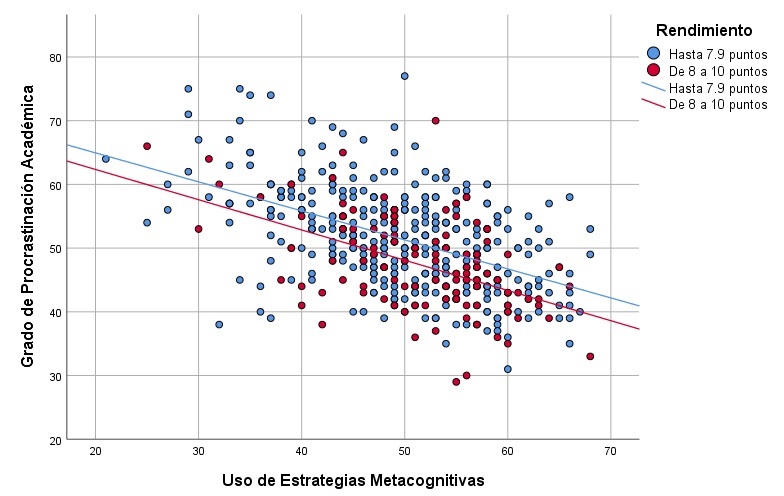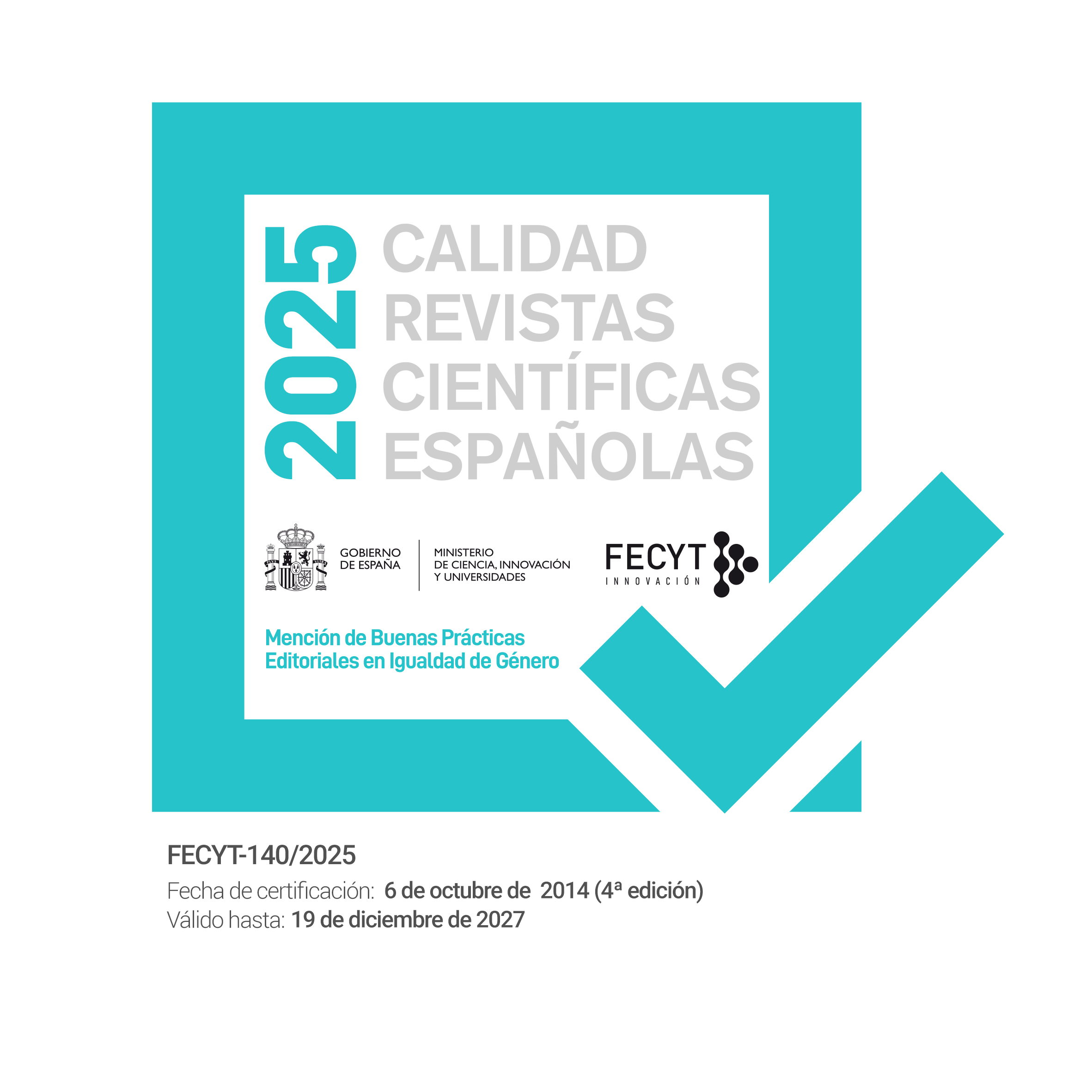Procrastination in pre-service teachers: the role of learning strategies and academic achievement
DOI:
https://doi.org/10.5944/educxx1.31553Keywords:
academic procrastination, metacognitive learning strategies, socio-affective learning strategies, academic achievement, gender, pre-service teacher educationAbstract
A high percentage of university students postpone their academic activities, which leads to academic and personal difficulties. The aim of this work is to identify and describe academic procrastination and its link to the use of metacognitive learning strategies, socio-affective strategies, and academic performance in pre-service teachers. The sample was made up of 794 bachelor’s and master’s degree students in teacher education who completed the Academic Procrastination Scale, the Procrastination Assessment Scale-Student (PASS), and the Metacognitive Strategies and Socio-affective Strategies scales of the ACRA scales. Descriptive, correlational, sample contrast, and hierarchical linear regression analysis shows there is a high percentage of students who habitually procrastinate, and who believe their behavior to be detrimental to them. Academic procrastination is negatively related to academic performance and the use of metacognitive and socio-affective strategies. Women evidence a lower level of academic procrastination than their male counterparts, although they believe it to be more detrimental to their academic activities. There are also differences in that women attribute the problem more to a lack of empathy and lack of self-confidence, whereas in men the problem is linked to the search for excitement. The variables which most predict procrastination are the low use of metacognitive strategies and the lack of energy and self-control. No differences were found between the years of the degree, age or regarding whether students are working or not, or the dedication this entails. We discuss the implications of the results in specific actions aimed at reducing procrastination behavior in university students.
Downloads
References
Abdi Zarrin, S., Gracia, E., & Paixão, M. P. (2020). Prediction of academic procrastination by fear of failure and self-regulation. Educational Sciences: Theory & Practice, 20(3), 34–43. https://doi.org/10.12738/jestp.2020.3.003
Balkis, M., & Duru, E. (2009). Prevalence of academic procrastination behavior among pre-service teachers, And its relationship with demographics and individual preferences. Journal of Theory and Practice in Education, 5(1), 18–32. http://eku.comu.edu.tr/index/5/1/mbalkis_eduru.pdf
Balkis, M., & Duru, E. (2017). Gender differences in the relationship between academic procrastination, satisfaction with academic life and academic performance. Electronic Journal of Research in Educational Psychology, 15(1), 105–125. http://doi.org/10.14204/ejrep.41.16042
Barnová, S., & Krásna, S. (2021). General procrastination and academic procrastination in pre-service teachers in the Slovak Republic. The Journal of International Education Science, 27(8), 1–11. https://doi.org/10.29228/INESJOURNAL.50845
Bäulke, L., Daumiller, M., & Dresel, M. (2021). The role of state and trait motivational regulation for procrastinatory behavior in academic contexts: Insights from two diary studies. Contemporary Educational Psychology, 65. https://doi.org/10.1016/j.cedpsych.2021.101951
Busko, D. A. (1998). Causes and consequences of perfectionism and procrastination: A structural equation model. [Tesis doctoral, University of Guelph]. https://hdl.handle.net/10214/20169
de la Fuente, J., Sander P., Garzón-Umerenkova, A., Vera-Martínez, M. M., Fadda S., & Gaetha, M. L. (2021). Self-regulation and regulatory teaching as determinants of academic behavioral confidence and procrastination in undergraduate students. Frontiers in Psychology, 12, 602904. https://doi.org/10.3389/fpsyg.2021.602904
Dunn, K., & Hayakawa, T. (2021). Destination irrational procrastination: An exploration of the role of attributional thinking and self-regulation on procrastination in synchronous online graduate studies. Online Learning, 25(2), 276–290. https://doi.org/10.24059/olj.v24i4.2205
Fernie, B. A., Kopar, U. Y., Fisher, P. L., & Spada, M. M. (2018). Further development and testing of the metacognitive model of procrastination: Self-reported academic performance. Journal of Affective Disorders, 240, 1–5. https://doi.org/10.1016/j.jad.2018.07.018
Franz, I. (2020). Unintentional procrastination, self control, and academic achievements. Education Economics, 28(5), 508-525. https://doi.org/10.1080/09645292.2020.1801596
Garzón-Umerenkova, A., & Gil, J. (2017). Propiedades psicométricas del TMBS en universidades. Revista Electrónica de Investigación Educativa, 19(4), 50–59. https://doi.org/10.24320/redie.2017.19.4.1340
Garzón-Umerenkova, A., Gil, J., & de la Fuente, J. (2020). Rasgos demográficos, académicos y personales asociados a tres tipos de procrastinación en el alumnado universitario. Bordón. Revista de Pedagogía, 72(1), 49–65. https://doi.org/10.13042/Bordon.2020.01.69513
Gil, J., De Besa, M. R., & Garzón-Umerenkova, A. (2020). ¿Por qué procrastina el alumnado universitario? Análisis de motivos y caracterización del alumnado con diferentes tipos de motivaciones. Revista de Investigación Educativa, 38, 183–200. http://doi.org/10.6018/rie.344781
Goroshit, M., & Hen, M. (2021). Academic procrastination and academic performance: Do learning disabilities matter? Current Psychology, 40, 2490–2498. https://doi.org/10.1007/s12144-019-00183-3
Hayat, A. A., Jahanian, M., Bazrafcan, L., & Shokrpour, N. (2020). Prevalence of academic procrastination among medical students and its relationship with their academic achievement, Shiraz E Medical Journal, 21(7), e96049, https://doi.org/10.5812/semj.96049
Hen, M., & Goroshit, M. (2020). The effects of decisional and academic procrastination on students’ feelings toward academic procrastination. Current Psychology, 39, 556–563. https://doi.org/10.1007/s12144-017-9777-3
Howell, A. J., & Watson, D. C. (2007). Procrastination: Associations with achievement goal orientation and learning strategies. Personality and Individual Differences, 43(1), 167–178. https://doi.org/10.1016/j.paid.2006.11.017
Kármen D., Kinga, S., Edit, M., Susana, F., Kinga, K. J., & Réka, J. (2015). Associations between academic performance, academic attitudes, and procrastination in a sample of undergraduate students attending different educational forms. Procedia - Social and Behavioral Sciences, 187, 45-49. https://doi.org/10.1016/j.sbspro.2015.03.009
Kim, K. R., & Seo, E. H. (2015). The relationship between procrastination and academic performance: A meta-analysis. Personality and Individual Differences, 82, 26–33. https://doi.org/10.1016/j.paid.2015.02.038
Kljajic, K., & Gaudreau, P. (2018). Does it matter if students procrastinate more in some courses than in others? A multilevel perspective on procrastination and academic achievement. Learning and Instruction, 58, 193–200. ttps://doi.org/10.1016/j.learninstruc.2018.06.005
Kurtovic, A. Vrdoljak, G., & Idzanovic, A. (2019). Predicting procrastination: The role of academic achievement, self-efficacy and perfectionism, International Journal of Educational Psychology, 8(1),1–26. https://doi.org/10.17583/ijep.2019.2993
Laybourn, S., Frenzel, A. C., & Fenzl, T. (2019) Teacher procrastination, emotions, and stress: A qualitative study. Frontiers in Psychology, 10, 2325. https://doi.org/10.3389/fpsyg.2019.02325
Limone, P., Sinatra, M., Ceglie, F., & Monacis, L. (2020). Examining procrastination among university students through the lens of the self-regulated learning model. Behavioral Sciences, 10(12), 184. http://doi.org/10.3390/bs10120184
Özer, Z., & Yetkin, R. (2018). Walking through different paths: Academic self-efficacy and academic procrastination behaviors of pre-service teachers. Journal of Language and Linguistic Studies, 14(2), 89-99. http://www.jlls.org/index.php/jlls/article/view/966/373
Pala, A., Akyıldız, M., & Bağcı, C. (2011). Academic procrastination behaviour of pre-service teachers’ of Celal Bayar University. Procedia - Social and Behavioral Sciences, 29, 1418-1425. https://doi.org/10.1016/j.sbspro.2011.11.381
Román, J., & Gallego, S. (1994). ACRA Escalas de Estrategias de Aprendizaje. TEA Ediciones.
Sæle, R. G., Dahl, T. I., Sørlie, T., & Friborg, O. (2017). Relationships between learning approach, procrastination and academic achievement amongst first-year university students. High Education, 74, 757–774. https://doi.org/10.1007/s10734-016-0075-z
Solomon, L. J., & Rothblum, E. D. (1984). Academic procrastination: Frequency and cognitive-behavioral correlates. Journal of Counseling Psychology, 31, 503–509. https://doi.org/10.1037/0022-0167.31.4.503
Steel, P. (2007). The nature of procrastination: a meta-analytic and theoretical review of quintessential self-regulatory failure. Psychological Bulletin, 133, 65–94. https://doi.org/10.1037/0033-2909.133.1.65
Steel, P., & Klingsieck, K. B. (2016). Academic procrastination: Psychological antecedents revisited. Australian Psychologist, 51(1), 36–46. https://doi.org/10.1111/ap.12173
Suárez-Perdomo, A., & Feliciano-García, L. (2020). Influencia del perfil de procrastinación activa en el rendimiento académico del alumnado de Ciencias de la Educación. Bordón, 72(3). 157–170. https://doi.org/10.13042/Bordon.2020.73642
Trujillo-Chumán, K., & Noé-Grijalva, M. (2020). La escala de Procrastinación académica-EPA: validez y confiabilidad en una muestra de estudiantes peruanos. Revista de Psicología y Educación, 15(1), 98-107. https://doi.org/10.23923/rpye2020.01.189
Visser, L. (2020). Academic Procrastination among First-year Student Teachers. Ridderprint BV.
Visser, L., Korthagen, F. A. J., & Schoonenboom, J. (2018). Differences in learning characteristics between students with high, average, and low levels of academic procrastination: students’ views on factors influencing their learning. Frontiers in Psychology, 9, 808. https://doi.org/10.3389/fpsyg.2018.00808
Wang, Y., Gao, H., Sun, C., Liu, J., & Fan, X. (2021). Academic procrastination in college students: The role of self-leadership. Personality and Individual Differences, 178. https://doi.org/10.1016/j.paid.2021.110866
Zhao, J., Meng, G., Sun, Y., Xu, Y., Geng, J., & Han, L. (2019). The relationship between self-control and procrastination based on the self-regulation theory perspective: the moderated mediation model. Current Psychology, 40(10), 5076-5086. https://doi.org/10.1007/s12144-019-00442-3

Downloads
Published
How to Cite
Issue
Section
License
Copyright (c) 2022 Luis J. Martín-Antón, Karina P. Aramayo-Ruiz, José L. Rodríguez-Sáez, María Consuelo Saiz-Manzanares

This work is licensed under a Creative Commons Attribution-NonCommercial 4.0 International License.
Educación XX1 is published under a Creative Commons Attribution-NonCommercial 4.0 (CC BY-NC 4.0)










